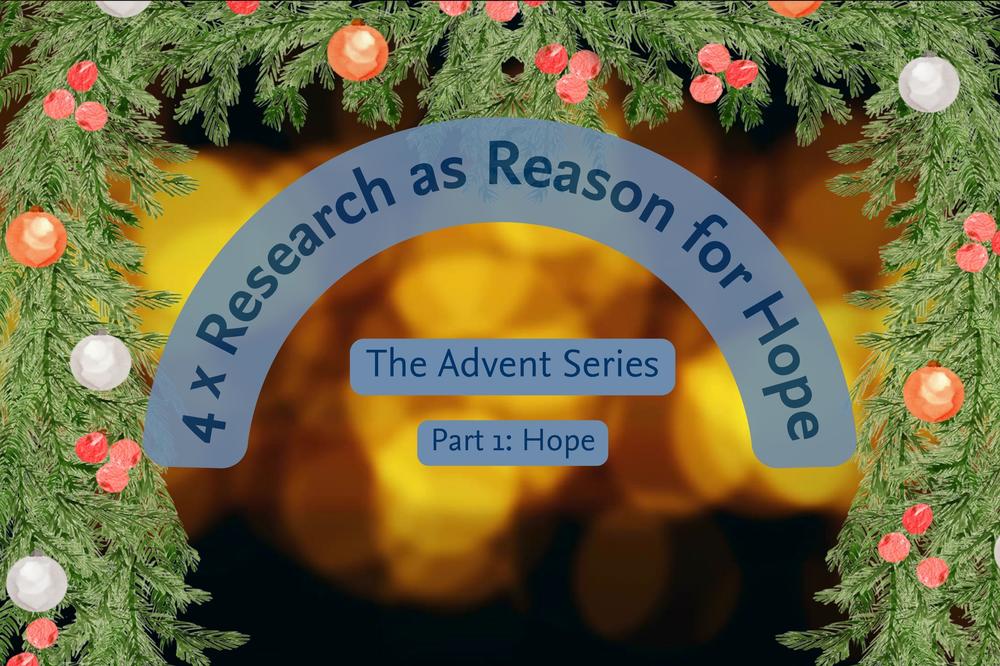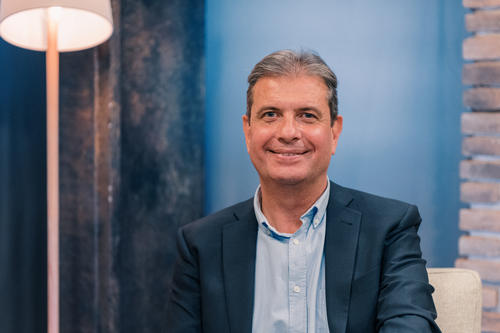“Hope is crucial for overcoming a crisis”
4 x Research as Reason for Hope / Part 1: Research on Hope
Dec 05, 2022
Not everything is as grim as it seems. During the Advent season, we are presenting four research topics that offer reason for hope.
Image Credit: Office of Communication and Marketing
War, climate change, Covid-19, rising inflation: we live in a time when seemingly one crisis follows another. Negative news affects our everyday life. However, not everything is as grim as it seems. During this Advent season we are presenting a series with four research topics that give cause for hope. Andreas Krafft starts things off: a social psychologist, who has a doctorate, Krafft is a lecturer in the master’s degree program on futures studies at Freie Universität and the University of St. Gallen. He publishes an annual study called the “Hope Barometer” that demonstrates how hopeful people around the world are about the future. We spoke to him about hope in times of crisis.
Dr. Krafft, how do you define hope?
Hope is first and foremost a heart’s desire. It is generally connected to the idea that the fulfillment of what I wish for is possible, but not necessarily probable or likely. There is an awareness that there are obstacles making things difficult. At the same time, as a hopeful person, I trust that I myself, other people, or institutions have the will and capabilities to fulfill my wish.
Hope research is a subdiscipline within positive psychology. What is that exactly?
Psychology deals primarily with mental illnesses and how to heal them. Positive psychology, which has existed as a discipline for about 20 years, deals with the positive aspects that help a person to lead a fulfilling life, such as trust, meaning, hope, and happiness.
What is the difference between hope and optimism?
An optimist would say, “Don’t worry, everything will be fine.” That can be very dangerous. If we assume that everything will be fine, there is no need for us to do anything for or against anything.
As a hopeful person, on the other hand, I am aware that the situation is difficult and know that it will not be easy to change something. However, I believe and trust that something can be done to improve things.
Right now, peace is a heart’s desire for many people. Why is hope important in times of crisis?
Hope is not only of importance in times of crisis. It is moreover the consequence that follows from a crisis. Without a crisis we would have neither the need for nor the opportunity to hope: Because there is war, I hope for peace. And during the coronavirus pandemic, people hope for health.
In a crisis hope is exactly what we need to overcome it. The Greek term krisi can be translated as “turning point”: the point at which things can go either up or down. Hope provides people with strength to get out of this crisis because hope leads to action. Hopelessness, on the other hand, is synonymous with giving up.
Andreas Krafft, who holds a doctorate in social psychology, teaches at the University of St. Gallen and Freie Universität Berlin.
Image Credit: ERF Medien Schweiz
So giving up hope in these difficult times should not be an option...
Hope always involves commitment and patience. The great challenges of our time such as climate change, peace, and prosperity, are not circumstances that can be changed overnight. We need a great deal of staying power. Great beacons of hope such as Martin Luther King or Nelson Mandela, who fought for decades for their goals, have already proven this. So hope is the basic attitude of not capitulating in the face of problems and crises, but to face them in order to improve something.
In addition, the past has shown us that no crisis lasts forever and that each one of us individually, as well as humanity as a whole, has been able to overcome crises. Crises are part of life. And they are a tremendous opportunity to learn and grow.
That may be true, but the current flood of negative news is still overwhelming for many people.
Fortunately, the majority of people are still experiencing more positive than negative things in life. However, we have a so-called negativity bias: This describes the sociopsychological phenomenon that negative feelings, thoughts, or experiences have a stronger psychological impact on us than positive or neutral ones.
From a developmental perspective, this makes perfect sense. We have always focused more on the negative because we needed to react to it. This negative tendency helped us to survive. It was more important to know where dangers lurked than to remember positive experiences.
However, this phenomenon did not help us to develop ourselves further. Humanity has primarily changed for the better through constructive acts and positive emotions. This gift of further developing beyond pure survival distinguishes people from other animals. It should be noted that such development is only possible if we focus not merely on the negative, but also on the positive. The Christmas season is well suited for this.
Melanie Hansen conducted the interview. It was first published in German in campus.leben on November 26, 2022.


